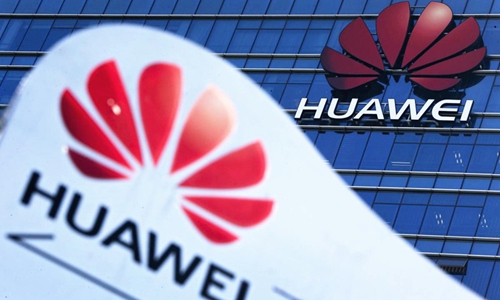HOME >> SOURCE
Huawei sues FCC over 'national security threat' label
Source:Global Times Published: 2019/12/5 11:03:40 Last Updated: 2019/12/5 22:24:53
The saga of Huawei versus the US continues. In its latest counterattack, Huawei announced on Thursday that it would sue the Federal Communications Commission (FCC), seeking to reverse an FCC order passed about two weeks ago which bans carriers from purchasing Huawei equipment through a federal subsidy plan.
The Chinese company asked the United States Court of Appeals for the Fifth Circuit to rule the FCC's order unlawful as it failed to offer Huawei required due process protections when labeling it as a national security threat, the firm said during a press conference at its headquarters in Shenzhen, South China's Guangdong Province.
"Banning a company like Huawei, just because we started in China - this does not solve cyber security challenges," Huawei's chief legal officer Song Liuping said.
Huawei also said it believes the FCC failed to substantiate its arbitrary findings with evidence, sound reasoning or analysis, which is in violation of the US Constitution, the Administrative Procedure Act and other laws.

Huawei's suit has been read by some overseas media as finally "showing its claws" after the embattled Chinese telecommunications giant has been repeatedly placed under scrutiny and sanctions by the US government, at a time when China-US relations are imperiled by the protracting trade war.
"This is a method of legal attack and defense. If Huawei only receives attacks but never fights back, it will lose its initiative. Even if Huawei can't win the lawsuit, it will place pressure on the US," communications expert Xiang Ligang told the Global Times on Thursday.
Glen Nager, Huawei's lead council for the legal action, said the FCC has simply adopted a rule without a standard, which goes beyond the agency's "statutory authority" as it is not authorized to make national security judgments or to restrict the use of subsidy funds based on such judgments.
"Indeed, the Commission has no national security expertise or authority," he said.
The FCC approved an order in November that would ban carriers receiving Universal Service Fund subsidies from using that money to buy equipment from companies considered a "national security threat," referring to Chinese companies Huawei and ZTE.
Huawei slammed the FCC's action as "unlawful" in a statement it released following the judgment, saying that the FCC's accusations against Huawei are based on "selective information, innuendo and mistaken assumptions."
The FCC ban came as a result of broader efforts by Washington to curb Huawei on a global scale amid the yearlong trade war with China.
The Trump administration has moved to block US businesses from working with the company. It has even considered the "nuclear-like" option of banning the firm from the US banking system. Sources close to the White House National Security Council have suggested that officials are considering placing Huawei on the Department of the Treasury's Specially Designated Nationals list, according to media reports.
The Chinese company asked the United States Court of Appeals for the Fifth Circuit to rule the FCC's order unlawful as it failed to offer Huawei required due process protections when labeling it as a national security threat, the firm said during a press conference at its headquarters in Shenzhen, South China's Guangdong Province.
"Banning a company like Huawei, just because we started in China - this does not solve cyber security challenges," Huawei's chief legal officer Song Liuping said.
Huawei also said it believes the FCC failed to substantiate its arbitrary findings with evidence, sound reasoning or analysis, which is in violation of the US Constitution, the Administrative Procedure Act and other laws.

The logo of China's tech giant Huawei. Photo: Xinhua
Huawei's suit has been read by some overseas media as finally "showing its claws" after the embattled Chinese telecommunications giant has been repeatedly placed under scrutiny and sanctions by the US government, at a time when China-US relations are imperiled by the protracting trade war.
"This is a method of legal attack and defense. If Huawei only receives attacks but never fights back, it will lose its initiative. Even if Huawei can't win the lawsuit, it will place pressure on the US," communications expert Xiang Ligang told the Global Times on Thursday.
Glen Nager, Huawei's lead council for the legal action, said the FCC has simply adopted a rule without a standard, which goes beyond the agency's "statutory authority" as it is not authorized to make national security judgments or to restrict the use of subsidy funds based on such judgments.
"Indeed, the Commission has no national security expertise or authority," he said.
The FCC approved an order in November that would ban carriers receiving Universal Service Fund subsidies from using that money to buy equipment from companies considered a "national security threat," referring to Chinese companies Huawei and ZTE.
Huawei slammed the FCC's action as "unlawful" in a statement it released following the judgment, saying that the FCC's accusations against Huawei are based on "selective information, innuendo and mistaken assumptions."
The FCC ban came as a result of broader efforts by Washington to curb Huawei on a global scale amid the yearlong trade war with China.
The Trump administration has moved to block US businesses from working with the company. It has even considered the "nuclear-like" option of banning the firm from the US banking system. Sources close to the White House National Security Council have suggested that officials are considering placing Huawei on the Department of the Treasury's Specially Designated Nationals list, according to media reports.
Posted in: INDUSTRIES,COMPANIES